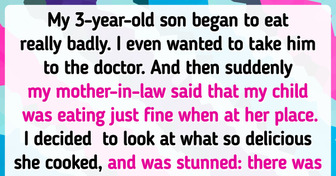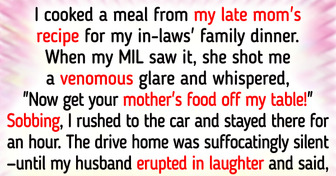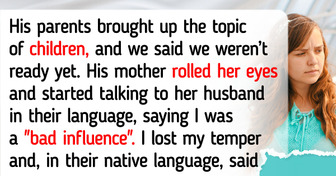16 Brave Girls Agreed to Compare Makeup Done by Them and by a Professional, and the Results Might Surprise You

Parenting styles and strategies change with time — some of them evolve and advance, while some get worse. It’s understandable that we want to learn from the positive things we experienced in childhood, but we also want to avoid repeating our parents’ mistakes. According to a survey, 9 out of 10 parents believe that their childhood has influenced how they raise their children, but only 6 out of 10 parents believe that the experience has been beneficial.
Experts suggest that there are several different ways in which our past is reflected in our present parenting situation. We at Bright Side decided to examine these parenting mistakes to help you avoid repeating them while raising your kids.
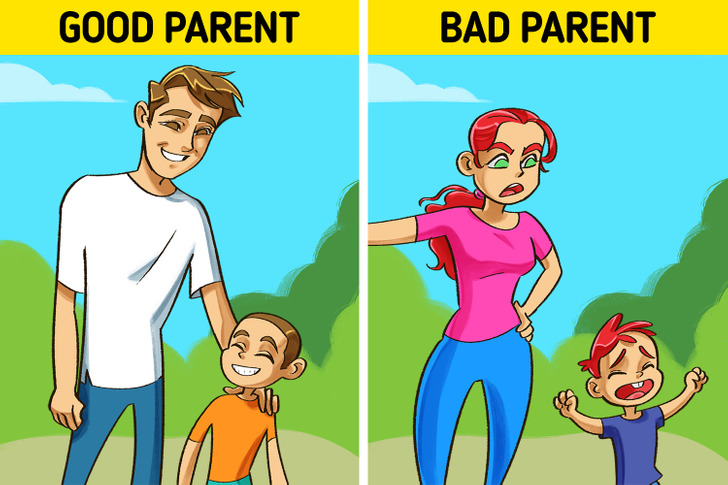
If you grew up in a household where one parent scolded you all the time while the other was permissible, you may find the same pattern repeated in your parenting. Your personality may fit into one of these categories naturally, but if you are constantly playing the same role, it can be a challenge to transition to the opposite side. Also, according to some research, this tactic can be hard on both parents and children.
It comes with a risk of confusing your child and making the “disciplinarian” parent look “bad.” This can often make the “strict” parent feel unhappy, and it can also lead to teenagers who respect the permissible parent but hesitate to open up to the “strict” one. So, instead of playing “good cop-bad cop,” a better option would be to share the burden of disciplining your children with your partner. A unified approach and agreeing on the type of punishment can be a much more balanced option.
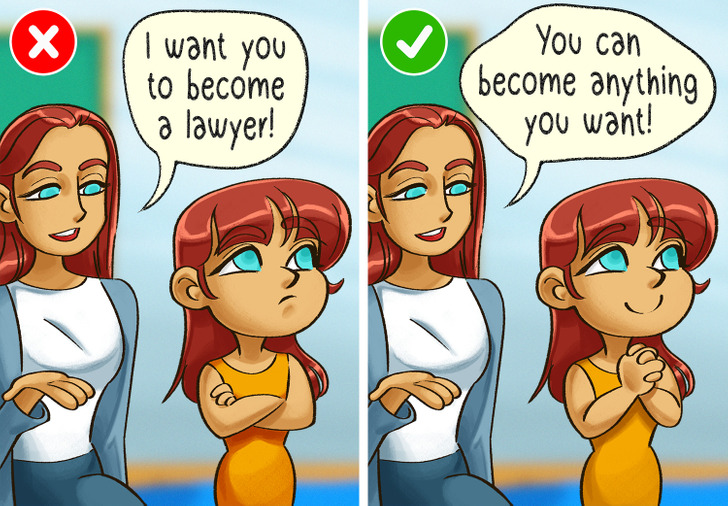
Sometimes, often unknowingly, we project our own childhood fears, dreams, and ambitions onto our kids. We assume our kids feel the same emotions, have the same ambitions, and experience things in the same way we did as children. Basically, it’s acting like we are parenting ourselves as kids.
We could expect them to pursue our passions instead of discovering and developing their own. This projection can make it difficult for us to perceive them as separate, unique individuals. But rather than assuming kids have the same needs as we did when we were children, parents should pay attention to and nurture their kids’ true needs, talents, and desires.
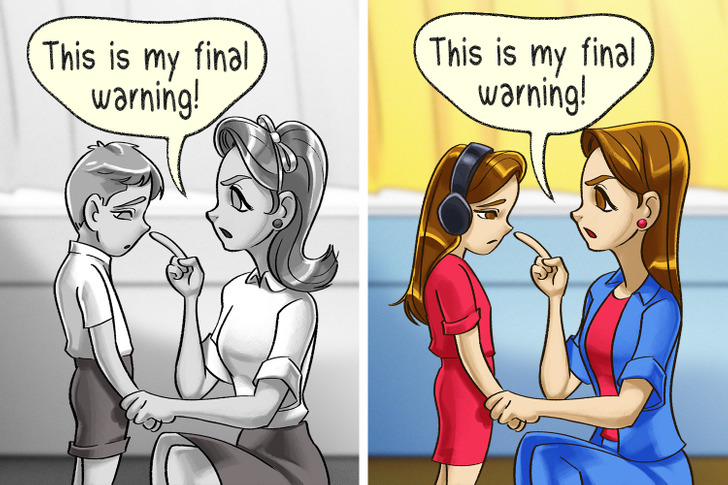
Some parents notice that they are acting the same way their parents did, especially in certain situations. We might catch ourselves using the same language as our parents or repeating the same negative actions we experienced growing up. But just because we learned something from our parents, it doesn’t make it right. If these comments and actions involve harsh words or physical punishment, then we really should try to change them for the better.
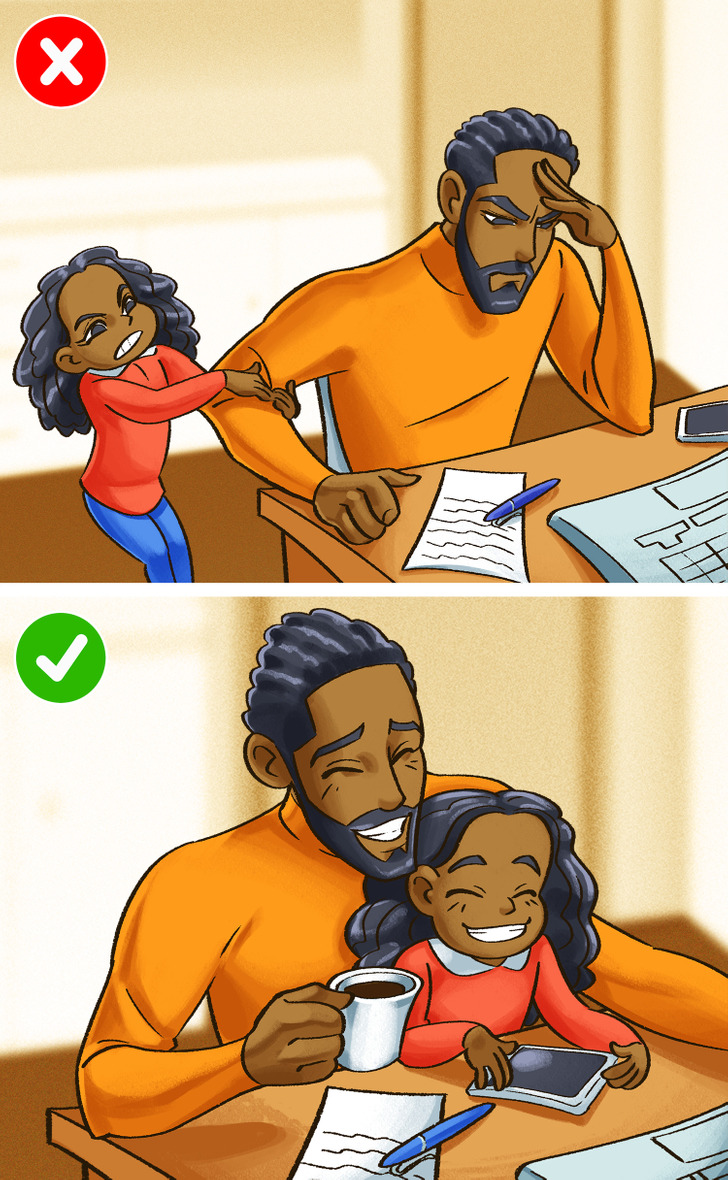
This behavior is quite common, and it occurs when we continue sticking to the same defense mechanisms that worked for us in our childhood. For instance, kids raised by a parent who was ignoring them may have learned how to be independent early on. And while being self-reliant may have positive effects, it can also compromise our relationships in adulthood, such as the relationship with our kids.
We may have difficulties showing our tender side to our kids, or not being able to open up to them fully. But to free ourselves from these patterns and discover who we really are, it’s crucial to know how our defense mechanisms work and to find a way to change them.

We may react to negative childhood experiences by trying to compensate for the way our parents treated us. But despite our good intentions, we should be careful to not overdo it. For instance, if our parents were somewhat strict, we may try to ’’correct’’ their mistake by being too permissible with our own children.
Or, if we grew up in a modest household, it may feel like we have to give much more to our kids. Instead of defining things that matter to us and our children in our current situation, we are stuck in reacting to things that affected us when we were growing up. This can make us overcompensate for our parent’s mistakes.
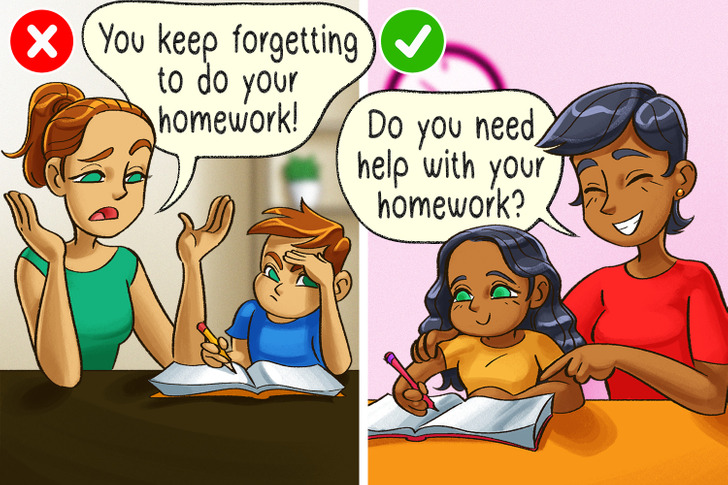
When we feel frustrated with our kids’ actions, it’s common for parents to “lose it” and become angry. But when we ’’get triggered’’ by situations that remind us of negative events when we were growing up, it’s time to get more mindful about what provoked the exaggerated reaction. When our child’s actions ’’trigger’’ us, we should try to figure out the cause for this behavior and not just get mad in the same way our parents used to with us.
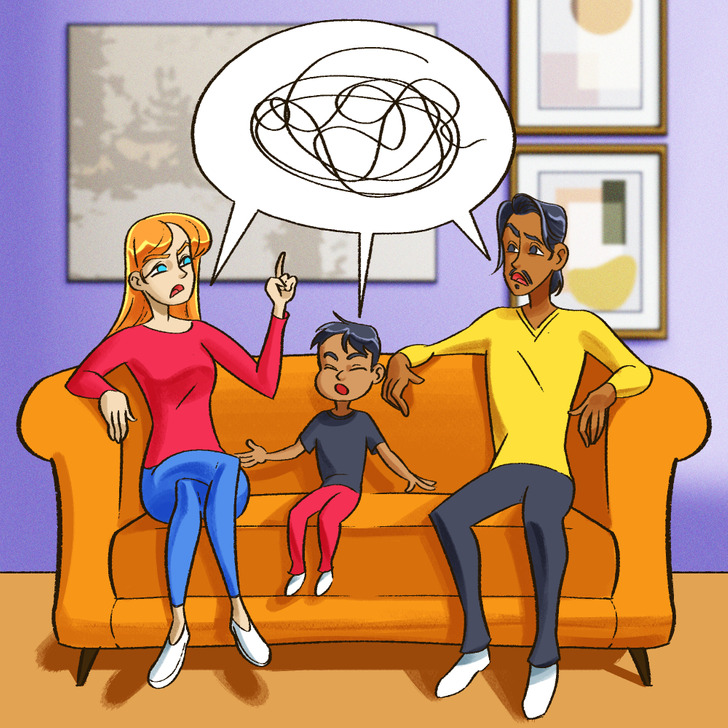
Whether circumstances in our childhood were favorable or not, we tend to develop some behavior patterns that can cause us to repeat or recreate the same, often negative, scenarios when we become parents. However uncomfortable these situations may be, we may be unconsciously recreating them because they seem familiar. For example, if your family didn’t talk openly about problems when you were growing up, you may find yourself repeating this same avoidant tactic, even though you consciously know it would be better to discuss what’s happening.
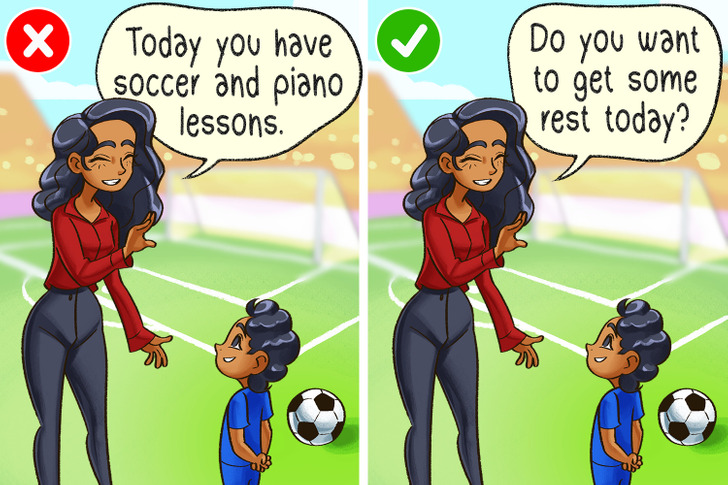
Parents who grew up participating in a number of activities tend to believe that this is the best way to keep their kids busy. But in fact, an overloaded schedule can make a kid exhausted and irritated. What’s more, oftentimes, these activities don’t even reflect a child’s interests. In many cases, this kind of overscheduling points to a lack of quality time between parents and children, usually because of parents’ inability to make time for their children after school.
It also reflects the desire of some parents to make their kids more “competitive.” While activities can be very beneficial for kids, parents should try to avoid putting a lot of pressure and stress on their kids by making them attend all kinds of activities. Instead, activities should be chosen wisely, and the importance of free play shouldn’t be neglected.
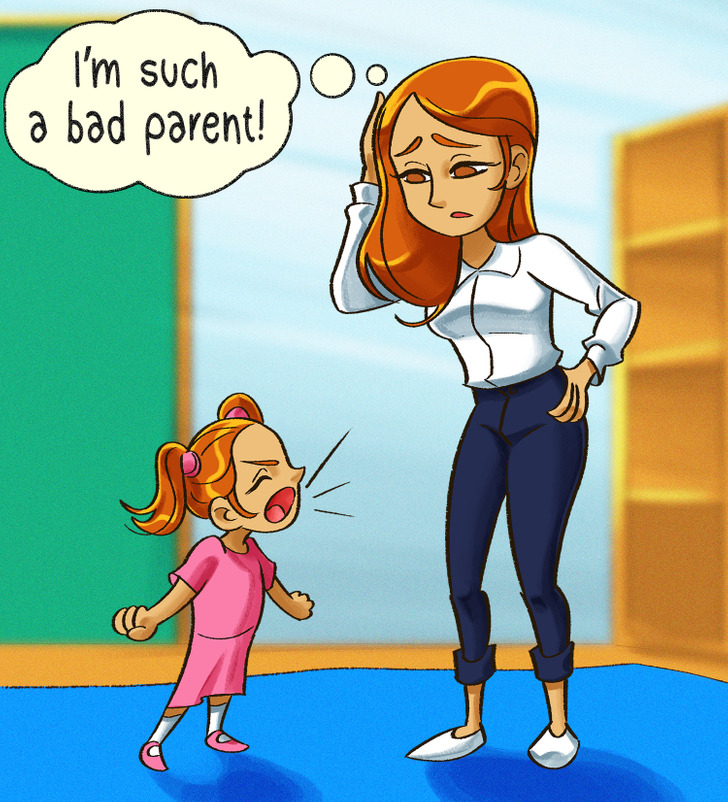
We sometimes continue to be influenced by the negative self-perceptions we developed early in life. And these insecurities tend to be even more noticeably exposed when we become parents. Maybe we felt inadequate or invisible as children, and we continue to perceive ourselves as weak in our adulthood. These weaknesses tend to be brought to the surface, especially when we try to discipline our own kids or appear strong for them.
Our childhood insecurities can come back to haunt us in the form of thoughts like: ’’I’m such a bad parent," “There is nothing I can do to make him/her obey,” “My kids don’t like me,” etc. But the more we question and challenge these negative voices, the freer and more confident we become. Getting to know ourselves helps us to recognize and remove negative thinking from our past and find our strength in the present.
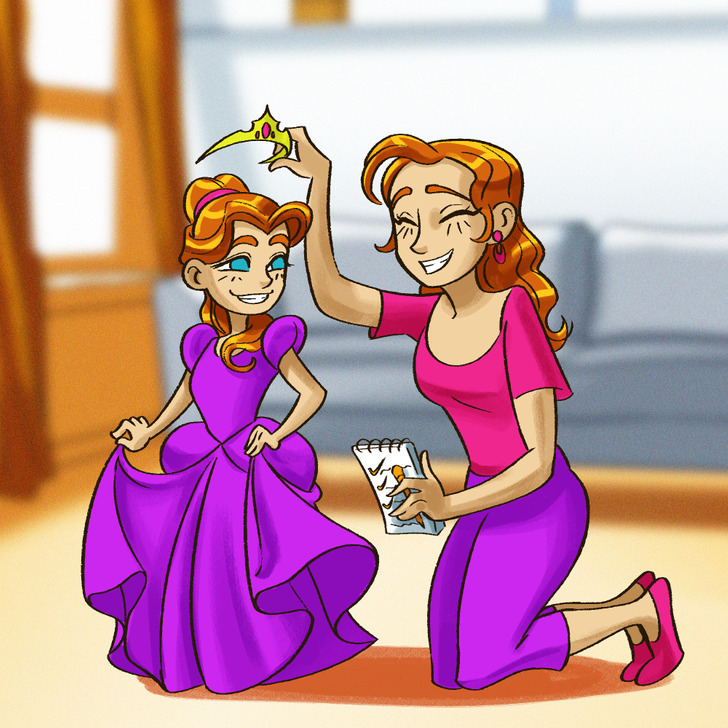
If you grew up in a family where perfectionism was required, you are likely to expect the same from your own children. While there’s nothing wrong with wanting your child to be successful and dream big dreams, expecting too much can lead to a number of emotional problems later in life. People raised by perfectionists often hide their emotions, can’t handle criticism well, or become people-pleasers.
That’s why it’s important to avoid expecting perfection and try to nurture healthy confidence in your kids by making your expectations realistic. And even if your children fail to live up to them, they will still learn an important lesson on how to achieve their goals the next time.
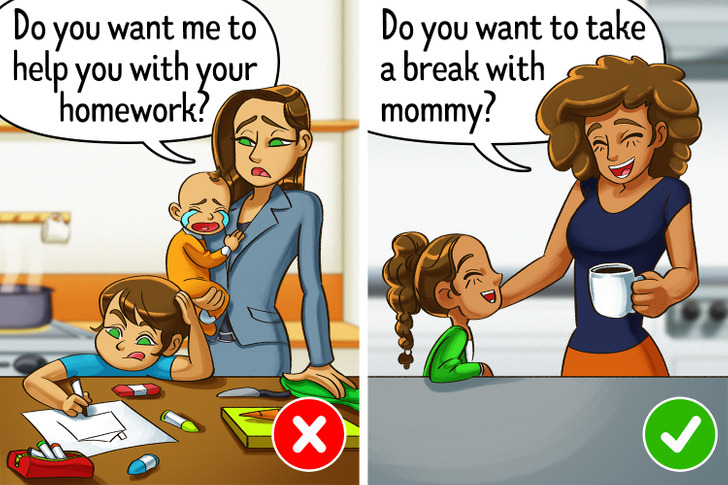
Most of us have experienced growing up with parents, especially moms, who were reluctant to take some time off of their parental duties. But we shouldn’t disregard the importance of self-care. That is something we usually learn from our mothers, and that’s why it’s important for parents to set a good example for their kids.
It’s also important to develop healthy coping skills together with your children. For example, if you had a difficult day, don’t hide your feelings from your kids. Instead, try sharing them by explaining why you feel the way you do and why you need some rest.
Have you ever unintentionally repeated the negative parenting patterns you experienced as a child? Share your experience with us in the comments.


